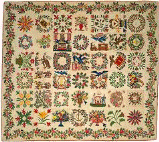Textile Society of America

Textile Society of America: Symposium Proceedings
Environmental Metrics in Action: Exploring U.S. Superfund Sites Affiliated with the Fashion Industry
Date of this Version
2024
Document Type
Presentation
Citation
Textile Society of America 2024 Symposium
Shifts & Strands: Rethinking the Possibilities and Potentials of Textiles, November 12-17, 2024, a virtual event
Abstract
Little is known of Superfund sites, long-term clean up sites, affiliated with the apparel and footwear supply chain in the United States. The United States Environmental Protection Agency (US EPA) manages the clean up of contaminated sites that pose a significant risk to human health and the environment under the Superfund program. A site can become contaminated if hazardous waste from industrial operations are mismanaged or dumped into the environment, in an uncontrolled manner. In this study, a proposed Superfund site (Mohawk Tannery in Nashua, New Hampshire), an active Superfund site (Ciba-Geigy Corp. in Toms River, New Jersery), and a deleted Superfund site (Martin-Marietta, Sodyeco, Inc. in Charlotte, North Carolina) that operated as part of the apparel and footwear supply chain are evaluated. The results convey some of the historical human health and environmental impacts. Additionally, the results underscore the practical use of publicly-accessible tools, including EPA’s Superfund National Priorities List (NPL) Where You Live mapping tool, EPA’s Environmental Justice Mapping and Screening tool (EJSCREEN), and a new tool launched under the Biden-Harris Administration’s Justice40 initiative, the Climate and Economic Justice Screening tool (CEJST). Resources presented in this study can be incorporated into fashion curriculum at universities, serve to support environmental activism efforts of nonprofit organizations, as well as to support the corporate social responsibility and compliance programs of companies in the supply chain.
Included in
Art and Materials Conservation Commons, Art Practice Commons, Environmental Indicators and Impact Assessment Commons, Environmental Public Health Commons, Environmental Studies Commons, Fashion Design Commons, Fiber, Textile, and Weaving Arts Commons, Fine Arts Commons, Museum Studies Commons, Operations and Supply Chain Management Commons, Textile Engineering Commons


Comments
Published by the Textiles Society of America
Copyright 2024, the author. Used by permission